英美留学优势分析.doc
英语作文,到国外留学的好处
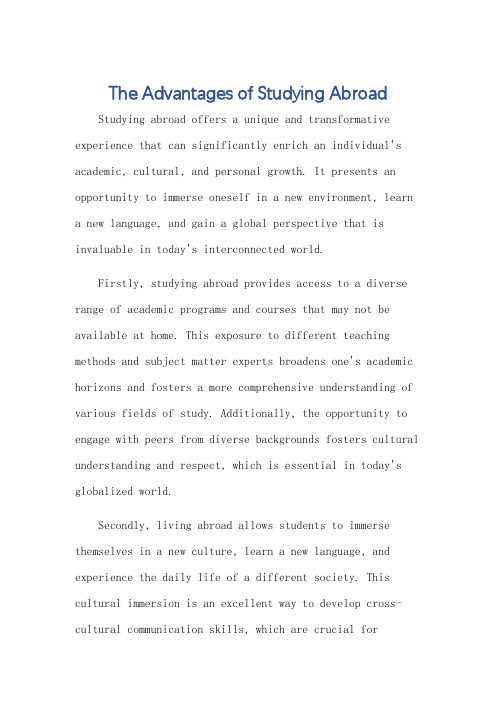
The Advantages of Studying AbroadStudying abroad offers a unique and transformative experience that can significantly enrich an individual's academic, cultural, and personal growth. It presents an opportunity to immerse oneself in a new environment, learn a new language, and gain a global perspective that is invaluable in today's interconnected world.Firstly, studying abroad provides access to a diverse range of academic programs and courses that may not be available at home. This exposure to different teaching methods and subject matter experts broadens one's academic horizons and fosters a more comprehensive understanding of various fields of study. Additionally, the opportunity to engage with peers from diverse backgrounds fosters cultural understanding and respect, which is essential in today's globalized world.Secondly, living abroad allows students to immerse themselves in a new culture, learn a new language, and experience the daily life of a different society. This cultural immersion is an excellent way to develop cross-cultural communication skills, which are crucial forsuccess in the international workforce. By interacting with native speakers and engaging in daily life activities, students can improve their language proficiency and gain a deeper understanding of the culture and values of the host country.Moreover, studying abroad fosters personal growth and development. Living in a new environment can be challenging, but it also provides an opportunity to discover more about oneself, including one's strengths, weaknesses, and preferences. This self-discovery can lead to personalgrowth and the development of new skills, such as adaptability, resilience, and independence.Additionally, studying abroad can enhance career opportunities. Many employers value the experience andskills gained through studying abroad, including cross-cultural communication, adaptability, and the ability to work in diverse teams. These skills are increasingly important in today's globalized economy, where companies often operate in multiple countries and collaborate with international partners.Finally, studying abroad is an opportunity to create lifelong friendships and networks. Students who studyabroad have the chance to meet people from around the world, form meaningful relationships, and build a global networkof friends and contacts. These relationships can provide support and assistance in the future, both personally and professionally.In conclusion, studying abroad offers numerous benefits that span across academic, cultural, and personal growth.It is an opportunity to broaden one's horizons, develop cross-cultural communication skills, and gain a global perspective that is invaluable in today's interconnected world. Whether it is for a semester, a year, or longer, studying abroad is a transformative experience that canhave a profound impact on an individual's life and future.**留学国外的好处**留学国外是一种独特而富有变革性的经历,能够极大地丰富个人的学术、文化和个人成长。
出国留学的好处英语作文

出国留学的好处英语作文出国留学的好处英语作文The Advantages of Studying AbroadIn recent years the trend of studying abroad has become increasingly popular among Chinese students. There are numerous advantages to studying abroad and here are some of the most significant ones.1. Cultural Exposure Studying abroad provides an unparalleled opportunity to immerse oneself in a new culture. This exposure can lead to a deeper understanding and appreciation of cultural diversity which is essential in our globalized world.2. Language Skills Living in a foreign country is one of the most effective ways to learn a new language. The constant interaction with native speakers helps to improve not only vocabulary and grammar but also the ability to understand colloquialisms and idiomatic expressions.3. Educational Excellence Many countries offer worldclass education with renowned institutions that are at the forefront of research and innovation. Studying at such institutions can provide access to cuttingedge knowledge and resources.4. Independence and Personal Growth Being away from home and familiar surroundings can be challenging but also incredibly rewarding. It fosters independence selfreliance and personal growth as students learn to navigate new environments and solve problems on their own.5. Networking Opportunities Studying abroad offers the chance to meet and interact with people from different countries and backgrounds. These connections can lead to valuable friendships and professional networks that can be beneficial throughout ones career.6. Global Perspective Living and studying in another country broadens ones perspective on global issues and can lead to a more nuanced understanding of international affairs.7. Career Enhancement An international education is often viewed positively by employers and can be a distinguishing factor in a competitive job market. It demonstrates adaptability language skills and a willingness to embrace new experiences.8. Adaptability The experience of adapting to a new culture educational system and way of life can make individuals more adaptable and flexible in their thinking which is a valuable trait in any professional setting.9. Cultural Competency In an increasingly interconnected world being culturally competent is crucial. Studying abroad helps develop the ability to communicate and work effectively with people from diverse backgrounds.10. Lifelong Memories Finally the experiences and memories gained from studying abroad are priceless. They can enrich ones life and provide a wealth of stories and experiences to share.In conclusion studying abroad is a transformative experience that offers a multitude of benefits from personal growth to professional development. It is an investment in ones future that can pay dividends in various ways throughout ones life.近年来出国留学的趋势在中国学生中越来越受欢迎。
留学生的优势英语作文

留学生的优势英语作文Advantages of Being an International StudentStudying abroad as an international student can bring a wealth of benefits that extend far beyond the classroom. From developing essential skills to broadening one's cultural understanding, the experience of being an international student offers a unique and invaluable opportunity for personal growth and development.One of the primary advantages of being an international student is the opportunity to immerse oneself in a new culture. By living and studying in a foreign country, students are exposed to different customs, traditions, and ways of life. This cultural immersion not only fosters a deeper appreciation for diversity but also encourages the development of adaptability and cross-cultural communication skills. As students navigate the challenges of adjusting to a new environment, they learn to be more open-minded, flexible, and adept at navigating unfamiliar situations.Moreover, being an international student often requires proficiencyin a second language, typically the language of the host country. This linguistic challenge presents a chance for students to enhance their language skills, which can be a valuable asset in today's increasingly globalized world. The ability to communicate effectively in multiple languages not only opens doors to a wide range of academic and professional opportunities but also enhances one's cognitive abilities. Studies have shown that bilingual individuals often exhibit greater cognitive flexibility, problem-solving skills, and creative thinking.Another significant advantage of being an international student is the opportunity to expand one's social network. By interacting with peers from diverse backgrounds, students can broaden their perspectives and gain a deeper understanding of different cultures and worldviews. These cross-cultural connections can lead to lifelong friendships and professional collaborations, fostering a global mindset that is highly valued in the modern job market.Furthermore, being an international student often requires a high degree of independence and self-reliance. Navigating a new educational system, managing finances, and adapting to a different lifestyle can be challenging, but these experiences can ultimately contribute to the development of essential life skills. International students often become more self-aware, resourceful, and resilient, qualities that are highly sought after by employers.In addition to the personal growth and skill development, being an international student can also provide academic advantages. Many universities offer specialized programs, resources, and support services tailored to the needs of international students, ensuring that they have the necessary tools to succeed in their studies. This can include access to language support, academic advising, and cultural orientation programs, all of which can enhance the overall educational experience.Moreover, the diverse perspectives and experiences that international students bring to the classroom can enrich the learning environment for all students. By sharing their unique cultural backgrounds and insights, international students can contribute to lively discussions, collaborative projects, and the exchange of ideas. This cross-pollination of knowledge and perspectives can lead to a deeper understanding of global issues and a more well-rounded education for all.Beyond the academic realm, being an international student can also open doors to valuable internship and employment opportunities. Many companies and organizations actively seek out international students for their diverse skill sets, language proficiency, and global mindset. These experiences can not only enhance one's resume but also provide valuable insights into different industries and career paths.Finally, the experience of being an international student can have a lasting impact on one's personal and professional development. The challenges faced and the skills acquired during this time can instill a sense of resilience, adaptability, and global awareness that can serve students well throughout their lives. The connections made and the perspectives gained can continue to shape one's worldview and open up new opportunities for personal and professional growth.In conclusion, the advantages of being an international student are numerous and far-reaching. From the cultural immersion and language development to the personal growth and academic benefits, the experience of studying abroad can be truly transformative. By embracing the challenges and opportunities that come with being an international student, individuals can develop a unique set of skills and perspectives that will serve them well in an increasingly globalized world.。
海外留学优点和缺点英语作文

海外留学优点和缺点英语作文Studying abroad has become an increasingly popular choice for students seeking to broaden their horizons and gain valuable life experiences. While the decision to study overseas can be both exciting and daunting, it is important to weigh the potential benefits and drawbacks before embarking on this journey. This essay will explore the key advantages and disadvantages of studying abroad.One of the primary advantages of studying abroad is the opportunity to immerse oneself in a new culture. By living and learning in a foreign country, students can gain a deeper understanding and appreciation for different customs, traditions, and ways of life. This cultural exposure can foster a greater sense of global awareness and cultural sensitivity, skills that are highly valued in today's increasingly interconnected world. Additionally, the experience of navigating a new environment and adapting to unfamiliar surroundings can help students develop important life skills, such as problem-solving, adaptability, and independence.Another significant benefit of studying abroad is the chance todevelop language proficiency. Depending on the host country, students may have the chance to learn or improve their fluency in a foreign language. This linguistic development can not only enhance academic and professional opportunities but also enrich personal relationships and social interactions. The ability to communicate effectively in multiple languages is a valuable asset in an increasingly globalized job market, and can open doors to a wide range of career paths.Furthermore, studying abroad provides students with the chance to expand their academic and intellectual horizons. By engaging with different educational systems, teaching methodologies, and areas of study, students can gain a fresh perspective on their chosen field of study. This exposure to diverse academic approaches can stimulate critical thinking, encourage creative problem-solving, and foster a deeper understanding of one's own field of study. Additionally, the opportunity to take courses or participate in research projects that may not be available at their home institution can broaden the scope of a student's educational experience.In terms of personal growth, studying abroad can be a transformative experience. The challenges and adjustments inherent in living and learning in a new environment can lead to increased self-awareness, independence, and resilience. Students may be required to navigate unfamiliar social situations, manage their ownfinances, and make decisions without the support of family and friends. These experiences can foster a greater sense of self-confidence and self-reliance, qualities that are highly valued in both academic and professional settings.However, it is important to acknowledge the potential drawbacks of studying abroad. One of the most significant challenges is the financial burden. Studying in a foreign country can be significantly more expensive than studying at a domestic institution, with costs ranging from tuition and housing to travel and living expenses. This financial strain can be particularly difficult for students from lower-income backgrounds, potentially limiting access to international educational opportunities.Another potential drawback of studying abroad is the sense of cultural and social isolation that some students may experience. Adapting to a new culture, language, and social norms can be a daunting and overwhelming process, and some students may struggle to form meaningful connections with their peers or integrate into the local community. This sense of isolation can lead to feelings of homesickness, loneliness, and even depression, which can negatively impact academic performance and overall well-being.Additionally, studying abroad may present logistical challenges, such as navigating unfamiliar bureaucratic systems, securing appropriatevisas and documentation, and ensuring access to necessary resources and support services. These practical hurdles can add significant stress and complexity to the study abroad experience, potentially detracting from the overall academic and personal growth that students hope to achieve.It is also important to consider the potential disruptions to one's academic progress that studying abroad may cause. Depending on the program and the host institution, students may face challenges in transferring credits, aligning course schedules, and ensuring that their academic progress remains on track. This can lead to delays in graduation, additional financial burdens, and the need to carefully plan and coordinate their academic journey.In conclusion, the decision to study abroad is a complex one, with both significant advantages and potential drawbacks. On the one hand, studying abroad can provide students with invaluable cultural, linguistic, academic, and personal growth opportunities, expanding their horizons and preparing them for success in an increasingly globalized world. On the other hand, the financial, social, and logistical challenges inherent in studying abroad can present significant barriers and disruptions to a student's academic and personal well-being.Ultimately, the decision to study abroad should be carefullyconsidered, weighing the potential benefits against the potential drawbacks. Students should thoroughly research their options, seek guidance from academic advisors and international education professionals, and develop a comprehensive plan to address the challenges they may face. By doing so, students can maximize the transformative potential of the study abroad experience and emerge as more globally-minded, adaptable, and resilient individuals.。
英语国家留学有哪些优势
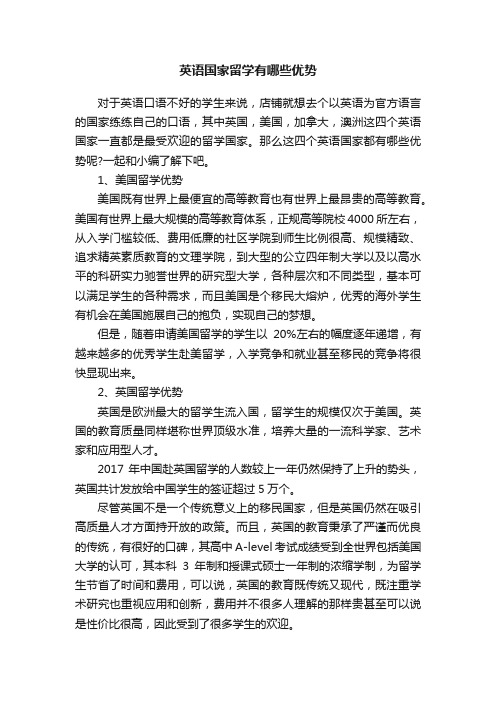
英语国家留学有哪些优势对于英语口语不好的学生来说,店铺就想去个以英语为官方语言的国家练练自己的口语,其中英国,美国,加拿大,澳洲这四个英语国家一直都是最受欢迎的留学国家。
那么这四个英语国家都有哪些优势呢?一起和小编了解下吧。
1、美国留学优势美国既有世界上最便宜的高等教育也有世界上最昂贵的高等教育。
美国有世界上最大规模的高等教育体系,正规高等院校4000所左右,从入学门槛较低、费用低廉的社区学院到师生比例很高、规模精致、追求精英素质教育的文理学院,到大型的公立四年制大学以及以高水平的科研实力驰誉世界的研究型大学,各种层次和不同类型,基本可以满足学生的各种需求,而且美国是个移民大熔炉,优秀的海外学生有机会在美国施展自己的抱负,实现自己的梦想。
但是,随着申请美国留学的学生以20%左右的幅度逐年递增,有越来越多的优秀学生赴美留学,入学竞争和就业甚至移民的竞争将很快显现出来。
2、英国留学优势英国是欧洲最大的留学生流入国,留学生的规模仅次于美国。
英国的教育质量同样堪称世界顶级水准,培养大量的一流科学家、艺术家和应用型人才。
2017年中国赴英国留学的人数较上一年仍然保持了上升的势头,英国共计发放给中国学生的签证超过5万个。
尽管英国不是一个传统意义上的移民国家,但是英国仍然在吸引高质量人才方面持开放的政策。
而且,英国的教育秉承了严谨而优良的传统,有很好的口碑,其高中A-level考试成绩受到全世界包括美国大学的认可,其本科3年制和授课式硕士一年制的浓缩学制,为留学生节省了时间和费用,可以说,英国的教育既传统又现代,既注重学术研究也重视应用和创新,费用并不很多人理解的那样贵甚至可以说是性价比很高,因此受到了很多学生的欢迎。
3、加拿大留学优势加拿大拥有所谓的“最适合人类居住的国家”的头衔,加之其毗邻美国的地理优势、丰富的自然资源和相对稀少的人口、完善的社会福利制度和相对宽松的移民政策,是中国学生店铺时的重点考虑对象。
出国留学选择英国还是美国更好

现在2022年的申请季很快也要开始了,英美作为热门留学国家,向来都有很多学生来申请的。
当然会有学生一直在纠结自己到底是选英国还是美国。
那么今天就把英美留学的区别来给大家讲讲,让大家作为参考。
一、英美学制区别1、本科教育阶段英国本科学士学位学制一般3年,而美国基本上是4年的本科学位制度,与中国类似。
英国教育总体来说分为三个阶段:义务教育,延续教育和高等教育。
美国的教育学制相对于其他资本主义国家,属于单轨制,注重多元化,各级各类学校间相互贯通联络,除了公立和私立以外,还有专注于本科教育的文理学院。
2、研究生教育阶段英国硕士阶段学制较短,一般为1年,而美国硕士阶段学制一般为1-2年,商科项目和理工科会有个别专业的项目是1年制。
英国对于成绩的考察方式与中国的大学颇为相似,成绩基本上由期末考试决定;而美国的大学,则比较注重学生平时的表现。
二、英美学位1、英国硕士学位设置MSC(授课型硕士学位)学期1年,是目前国内学生去读硕士选择最多的学位,学生不停地上课,学习理论,最后挑选一个课题写一篇论文毕业即可,它主要是面向工作,而非面向研究,毕业后可以直接走向工作岗位,但是也会有MSC的毕业生选择继续申博。
MSc by Research(研究型硕士学位)学期1年,与MSC不同,这个学位在读期间主要是做研究,导师仅给学生提供指导和建议,而大部分时间是学生自己进行创新型研究,最终的目标是提交一篇学位论文,来证明你对于专业相关的某个领域的理解。
MRes(Master of Research-研究型硕士)学期1年,招生规模小,申请难度大,这一学位主要是为想继续攻读博士的学生设置的。
它在这一年内不仅有科研的要求,还有修课的要求,这也是与MSC不同的地方。
对于学生来说,挑战也比较大,在一年之内既要完成课程学习,完成理论知识的积累,也要完成学术研究。
2、美国硕士学位设置学术型硕士学位(Academic Masters)主要分为:理学硕士MS:Master of Science ,文学硕士MA:Master of Arts ,研究硕士MRes:Master of Research ,哲学硕士MPhil:Master of Philosophy。
留学英国总结报告范文(3篇)
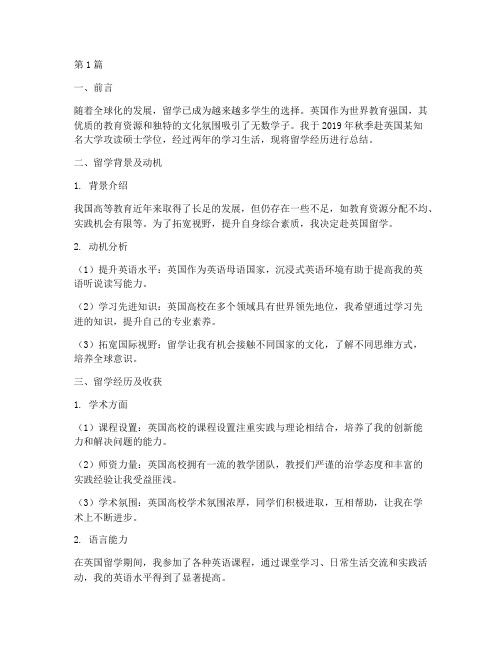
第1篇一、前言随着全球化的发展,留学已成为越来越多学生的选择。
英国作为世界教育强国,其优质的教育资源和独特的文化氛围吸引了无数学子。
我于2019年秋季赴英国某知名大学攻读硕士学位,经过两年的学习生活,现将留学经历进行总结。
二、留学背景及动机1. 背景介绍我国高等教育近年来取得了长足的发展,但仍存在一些不足,如教育资源分配不均、实践机会有限等。
为了拓宽视野,提升自身综合素质,我决定赴英国留学。
2. 动机分析(1)提升英语水平:英国作为英语母语国家,沉浸式英语环境有助于提高我的英语听说读写能力。
(2)学习先进知识:英国高校在多个领域具有世界领先地位,我希望通过学习先进的知识,提升自己的专业素养。
(3)拓宽国际视野:留学让我有机会接触不同国家的文化,了解不同思维方式,培养全球意识。
三、留学经历及收获1. 学术方面(1)课程设置:英国高校的课程设置注重实践与理论相结合,培养了我的创新能力和解决问题的能力。
(2)师资力量:英国高校拥有一流的教学团队,教授们严谨的治学态度和丰富的实践经验让我受益匪浅。
(3)学术氛围:英国高校学术氛围浓厚,同学们积极进取,互相帮助,让我在学术上不断进步。
2. 语言能力在英国留学期间,我参加了各种英语课程,通过课堂学习、日常生活交流和实践活动,我的英语水平得到了显著提高。
3. 人际交往(1)结识朋友:在英国,我结识了来自世界各地的朋友,与他们交流学习经验,拓展了人际交往能力。
(2)融入当地文化:通过参加各种文化活动,我了解了英国的历史、文化和社会风俗,增强了跨文化沟通能力。
4. 独立生活能力在英国留学期间,我学会了独立生活,包括财务管理、家务处理等,这对我今后的成长具有重要意义。
四、留学反思及建议1. 反思(1)适应期较长:初到英国,我面临语言、文化等方面的挑战,适应期较长。
(2)时间管理:在英国留学期间,我意识到时间管理的重要性,学会了合理安排时间,提高效率。
2. 建议(1)提前做好留学准备:了解英国的文化、教育制度和生活习惯,做好心理准备。
留学英国主要优势一览

【导语】英国是不少⼩伙伴憧憬的留学国家,英国的⾼质量教育⼀直被世⼈称赞。
下⾯是⽆忧考分享的留学英国主要优势⼀览。
欢迎阅读参考!1.留学英国主要优势⼀览 1、教育质量⾼且学制短 英国教育素以⾼质量和严要求⽽闻名于世,英国⼤学本科学制三年,拿到学位的时间⽐绝⼤多数国家都要短,这⽆形中节约了⼤笔⾦钱和时间。
2、⽂凭含⾦量⾼ 英国是现代⼤学的发源地,英国的⾼等教育在世界上享有极⾼的声誉,英国的120多所⼤学中有不少⽜津、剑桥这样的⼤学,因此对海外留学⽣来说有⾮常⼤的吸引⼒。
3、签证⽅便快捷 英国使馆简化了留学签证申请⼿续,使得所需签证材料更简单,签证申请周期较其它国家更短,⽽且容易⼀次性办理成功。
4、地道的语⾔环境 英国是语⾔的发源地,每⼀位店铺的学⼦,都渴望在归国后,能说⼀⼝流利的英语,选择英国留学,可以让你掌握纯正优雅的英式英语。
5、悠久的历史⽂化底蕴 英国相对于美国、澳洲这些新⽣国家⽽⾔,历史底蕴更为丰富,⾛在英国街头,你会不经意间感受到英式贵族的绅⼠⽓度,领悟到英式优雅的礼仪做派。
英国的城市⾥留存了各式各样的古⽼建筑,即便翻修,也尽⼒不去破坏原有的风韵,所以学⽣去英国留学,可以感受到⼀个欧洲国家悠久的历史⽂化底蕴。
2.本科留学英国申请要求 1.学历要求 申请英国本科,需要申请⼈具备⾼⼆及以上学历,并且提供⾼中两年成绩单,部分学校还要求提供⾼中毕业证书。
⼀般中国学⽣不能直接申请英国本科,需要就读⼀年预科课程。
此外,国内⾼⼆学⽣可以选择两年的 A-Level课程后再进⼊英国的本科课程。
2.语⾔要求 申请英国本科,⼀般要求不低于 5.0⾄5.5分的雅思成绩,部分学校及专业6.0分及以上。
语⾔成绩不⾜的学⽣,也开设了语⾔课程。
3.费⽤要求 申请英国本科,费⽤⽅⾯,基本包括预科费⽤,⼤学学费,⽣活费⽤。
预科费⽤⽅⾯,⼀年的预科课程普遍价位在£ 1.3-1.5万英镑/年。
⼤学学费⽅⾯,理科:1.3 -1.7万英磅/年;医科:1.5-2.5英磅/年;⽂科:1.3 -1.7英磅/年;商科:1.5 -2.0万英磅/年。
study abroad advantages disadvantages

study abroad advantagesdisadvantages出国留学的利弊出国留学是一个具有挑战性和有益的经历,但也有一些潜在的缺点。
以下是出国留学的一些优点和缺点:优点:1. 丰富的学术和文化体验:出国留学可以让你接触到不同的教育体系和学术氛围,拓宽你的学术视野。
你还将有机会深入了解其他文化,培养跨文化交流能力。
2. 语言学习机会:生活在国外的语言环境中,能帮助你更快速、更有效地学习一门新语言。
这不仅对你的学术和职业发展有益,还能增强你的跨文化交际能力。
3. 国际人脉和职业机会:通过与来自世界各地的学生和教师交流,你将建立广泛的国际人脉。
这些联系可能对你未来的职业发展产生积极影响。
4. 独立和自我成长:在异国他乡生活和学习需要很强的适应能力和独立性。
这是一个培养自我管理、解决问题和应对挑战能力的好机会。
缺点:1. 文化冲击和适应困难:适应新的文化、习俗和生活方式可能是一个具有挑战性的过程。
文化冲击可能导致思乡、孤独和心理压力。
2. 高昂的费用:出国留学可能需要支付高昂的学费、生活费用和旅行费用。
这可能对一些家庭的经济造成负担。
3. 学业压力和适应新教育体系:在国外学习可能需要适应不同的教育体系和教学方法,这可能给你的学业带来额外的压力。
4. 家庭和社交分离:长时间远离家乡和亲人可能导致社交隔离和家庭分离,这可能对一些人造成困扰。
综上所述,出国留学有许多优点,但也存在一些缺点。
在决定是否出国留学时,需要仔细权衡利弊,并考虑个人的目标、财务状况和适应能力。
对于那些有决心和准备充分的人来说,出国留学可以是一次丰富多彩、有益于个人成长的经历。
出国留学优点英语作文
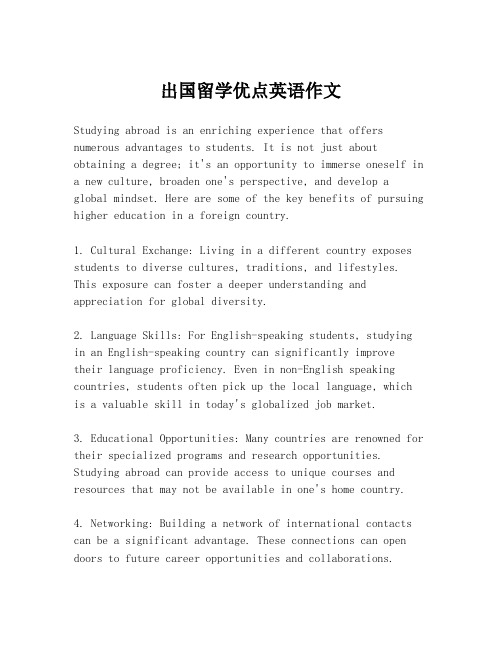
出国留学优点英语作文Studying abroad is an enriching experience that offers numerous advantages to students. It is not just about obtaining a degree; it's an opportunity to immerse oneself in a new culture, broaden one's perspective, and develop a global mindset. Here are some of the key benefits of pursuing higher education in a foreign country.1. Cultural Exchange: Living in a different country exposes students to diverse cultures, traditions, and lifestyles. This exposure can foster a deeper understanding and appreciation for global diversity.2. Language Skills: For English-speaking students, studying in an English-speaking country can significantly improvetheir language proficiency. Even in non-English speaking countries, students often pick up the local language, which is a valuable skill in today's globalized job market.3. Educational Opportunities: Many countries are renowned for their specialized programs and research opportunities. Studying abroad can provide access to unique courses and resources that may not be available in one's home country.4. Networking: Building a network of international contacts can be a significant advantage. These connections can open doors to future career opportunities and collaborations.5. Personal Growth: Being in a foreign environment challenges students to step out of their comfort zones. It encourages independence, self-reliance, and adaptability—traits thatare highly valued in the professional world.6. Employability: Graduates who have studied abroad are often seen as more employable due to their international experience, language skills, and the ability to navigate differentcultural contexts.7. Travel Opportunities: The proximity to other countries and cultures allows for easy travel and exploration. Students can take advantage of their location to visit new places and gain a broader understanding of the world.8. Quality of Education: Institutions in certain countriesare known for their high standards of education and research. Studying at such institutions can provide a strong foundation for a student's academic and professional career.9. Global Perspective: Living and studying in a different country can help students develop a more global perspectiveon issues, which is essential in today's interconnected world.10. Lifelong Memories: The experiences gained from studying abroad often lead to lifelong memories and friendships. It'sa unique time in one's life that can shape personal and professional goals.In conclusion, studying abroad is more than just an academic pursuit; it's a transformative journey that can have lastingimpacts on a student's personal and professional life. It opens up a world of opportunities and equips individuals with the skills necessary to thrive in a globalized economy.。
美国留学后的就业优势分析
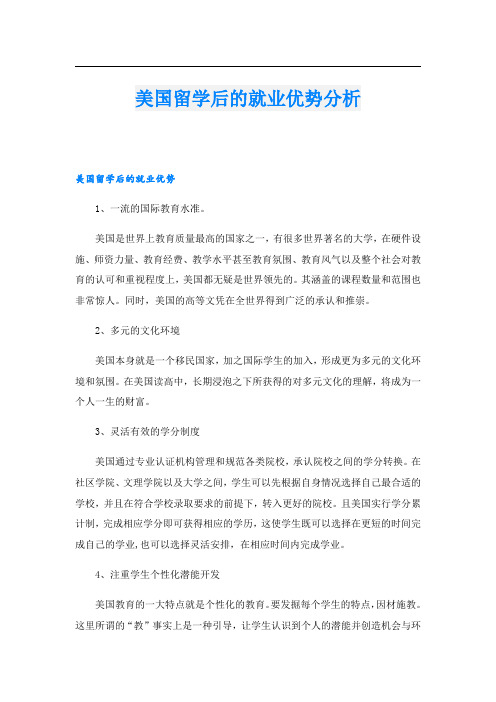
美国留学后的就业优势分析美国留学后的就业优势1、一流的国际教育水准。
美国是世界上教育质量最高的国家之一,有很多世界著名的大学,在硬件设施、师资力量、教育经费、教学水平甚至教育氛围、教育风气以及整个社会对教育的认可和重视程度上,美国都无疑是世界领先的。
其涵盖的课程数量和范围也非常惊人。
同时,美国的高等文凭在全世界得到广泛的承认和推崇。
2、多元的文化环境美国本身就是一个移民国家,加之国际学生的加入,形成更为多元的文化环境和氛围。
在美国读高中,长期浸泡之下所获得的对多元文化的理解,将成为一个人一生的财富。
3、灵活有效的学分制度美国通过专业认证机构管理和规范各类院校,承认院校之间的学分转换。
在社区学院、文理学院以及大学之间,学生可以先根据自身情况选择自己最合适的学校,并且在符合学校录取要求的前提下,转入更好的院校。
且美国实行学分累计制,完成相应学分即可获得相应的学历,这使学生既可以选择在更短的时间完成自己的学业,也可以选择灵活安排,在相应时间内完成学业。
4、注重学生个性化潜能开发美国教育的一大特点就是个性化的教育。
要发掘每个学生的特点,因材施教。
这里所谓的“教”事实上是一种引导,让学生认识到个人的潜能并创造机会与环境使这种潜能得以全面的发挥和挖掘。
美国教育更注重培养孩子实践精神。
他们愿意在实践中教育孩子,这样掌握的知识才是活的,才能充分发挥孩子的潜能和想象力。
知识与世界接轨,走在世界的前沿,亦是很多美国高中及高校所遵循的原则。
5、公平、丰富的奖学金制度美国大学非常重视对人才的吸引和投资,奖学金种类繁多,大致可分为非服务性奖学金、服务性奖学金和学校贷款三种。
其中以非服务性奖学金申请比率最大,金额也最多。
即使你是国际学生,只要在各方面都很优秀,申请到减免学费、全额或部分奖学金的机会也非常大。
6、更好的职业发展空间美国拥有积极的移民政策,能为每一个留学生提供一条留美发展的道路。
在美国完成学业后,可以选择就业或继续深造。
出国留学的优势有哪些

出国留学的优势有哪些1.国际化视野:出国留学可以帮助学生拓宽视野,了解世界各地的不同文化、历史和社会制度,使其具备开放和包容的思维方式。
这有助于增强跨国交流和合作的能力,为未来的职业发展提供优势。
2.语言能力提升:留学可以提供语言学习的机会,特别是英语等全球通用语言的学习。
通过完全沉浸在以英语为主要交流语言的学习和生活环境中,学生能够迅速提高语言理解和表达的能力,成为一个更为流利的国际沟通者。
3.学术水平提高:海外知名大学或学术机构通常拥有优质的师资力量和先进的教学资源,这使得学生有机会接触到最前沿的学术研究和讨论,从而提高自己的学术水平。
此外,留学还可以提供良好的科研平台和机会,鼓励学生积极参与科研活动,增加研究经验和论文发表机会。
4.就业竞争力:留学期间,学生有机会接触到国外先进的教育体系和职业培训机构,了解不同国家、不同领域的就业市场需求和就业前景。
在世界范围内寻找就业机会不仅拓宽了就业选择,还能提高毕业生的竞争力。
5.跨文化交流:出国留学能帮助学生与来自不同国家和背景的同学互动,增进人际关系和跨文化交流的经验。
这有助于培养学生的社交和领导能力,提高解决问题和合作的能力。
6.自我成长和独立性:出国留学需要学生独立处理生活和学习的方方面面,如日常生活安排、住宿、学习计划等。
这种自主性培养了学生的自我管理和解决问题的能力,增加了他们的自信心和适应能力。
7.人脉资源:出国留学提供了广泛的社交机会,学生能够结识志同道合的同学、教授和校友等,形成有价值的人脉资源。
这对于未来的职业发展和事业成功非常重要。
8.文化体验和多元思维:留学国家的文化和社会环境与中国有较大差异,学生有机会亲身体验并从中汲取教益。
这有助于培养学生的多元思维和灵活性,提高解决问题的能力和创新精神。
总之,出国留学的优势不仅在于学术上的提升,还包括了语言能力、国际交流与合作能力、职业发展和个人成长等方面的全面提高。
这些优势将为学生未来的职业发展和人生路径提供更多可能性和机遇。
美国本科留学的八大优势!

高考后去美国本科留学,都有哪些优势与好处呢?快和小编一起来看看吧~优势一、留学性价比高这是非常重要的原因,人民币对美元的汇率一直在提高,这种也就是说美国留学成本降低,促使很多小康家庭可以去美国留学。
优势二、国际教育资源最新的2016年世界大学前100强中,美国大学的数量占了近半数,使美国教育部高兴的是第一名和第二名是美国的大学。
在配套设施、师资水平、教育支出、教学等级甚至教育环境以及整个社会对教育的认知及重视程度上,美国都无疑是世界第一位的。
同时,美国的高等教育学历在全世界得到广泛的承认和推崇。
优势三、丰厚奖学、金助学金美国大学非常重视吸引和投资人才。
即使你是一名国际学生,只要你在各方面都优秀,你将有很大的机会申请免除学费,全额或部分奖学金。
此外,只要学生在学校表现良好,奖学金可以支持他们在美国学习期间的所有学费和生活费用,这在其他出国留学的国家几乎是不可能的。
优势四、灵活有效的学分制美国的高等院校实行学分制,只要学生完成了必修课程和规定学分就可以毕业并获得相应的学位。
因此,经过周密的计划和实施,学生完全有可能在三年内完成本科课程、或在一年内完成硕士课程;也可能同时获得主修加辅修学位、双学位或三个学位,而不需要花费两至三倍的时间和费用。
优势五、专业选择为了给学生充分的时间考虑自己的兴趣和将来的发展,美国很多学校不要求本科一、二年级的学生选择明确的专业方向,除了某些专业特殊要求的课程,本科一、二年级的课程基本上是为所有学生共同设置的。
在三、四年级时候自主选择专业。
有些学生选择了某专业,希望更改,也可以随时提出申请,重新选择。
另外,在申请攻读研究生学位时,学生完全可以根据自己的实际情况选择与本科不同的专业。
优势六、文化的交流与融合美国不仅是一个文化大国,同时也是全世界不同种族、不同文化人群最集中的国家。
作为一个移民国家,美国欢迎来自世界各地的外国人到美国寻求发展,尤其是外国留学生。
美国大学中的一半学校可以招收国际学生,而每年全美大学招收的新生有接近1/3是国际学生。
英文辩论出国留学优缺点
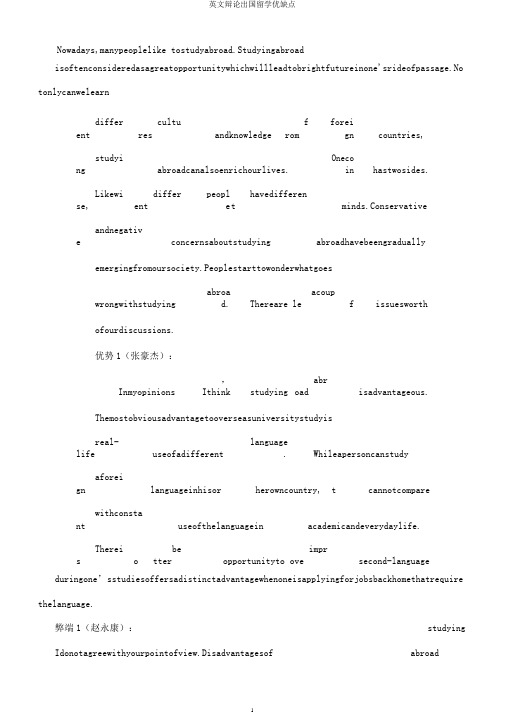
Nowadays,manypeoplelike tostudyabroad.Studyingabroadisoftenconsideredasagreatopportunitywhichwillleadtobrightfutureinone'srideofpassage.No tonlycanwelearndiffer entcultures andknowledgefromforeign countries,studying abroadcanalsoenrichourlives.Onecoin hastwosides.Likewi se,differentpeoplehavedifferent minds.Conservativeandnegative concernsaboutstudying abroadhavebeengraduallyemergingfromoursociety.Peoplestarttowonderwhatgoeswrongwithstudying abroad.Thereareacoupleof issuesworthofourdiscussions.优势1(张豪杰):Inmyopinions,Ithink studyingabroad isadvantageous.Themostobviousadvantagetooverseasuniversitystudyisreal-life useofadifferent language.Whileapersoncanstudyaforeign languageinhisor herowncountry,t cannotcomparewithconstant useofthelanguagein academicandeverydaylife.Therei snobetter opportunitytoimprove second-languageduringone’sstudiesoffersadistinctadvantagewhenoneisapplyingforjobsbackhomethatrequire thelanguage.弊端1(赵永康):Idonotagreewithyourpointofview.Disadvantagesofstudying abroadandeconomically. WeChinesewill experience cultural shocksif westudyabroadandliveinanothercountry.Somepeersmaynotbeabletoadapttoanewenvironmentofthei rstudyingandliving,whichmaybeverydifferentfromthatoftheirs.Lifeisbeautiful,andit ishard.Ifonedoes notfeelcomfortablewiththenewcultureofanothercountry,hewillnotbehappyaboutstudyinginthatcountry.优势2(张书军):Idon’tthink so.Studying abroad,youlearn totakecareofyourself.Livinginanothercountry,evenifitiswithahostfamily,meansyoumightbedoingthingsyoumaynothavedoneinyourhomecountry.Theseincludeco oking,cleaning,groceryshopping,washingclothes,figuringouttransportation,makinglivingarrang ements,settingupaccountsforcellphonesandutilities,etc.Youmaythinkofthisasadisadvantage,but manyinternationalstudentsgohomeproudthattheyhavebecomeveryselfsufficient.弊端2(张太伟):Doyouknowstudying abroadwill coststudents agreat dealoflivingexpenses?SomeChinesestudentsaresoacademicallysuccessfulthattheyreceivescholarshipsintheirstudies.However, most peers who study abroad do not receivescholarships.Furthermore,theyhavetodealwithmanyunexpectedhardshipsbylivingawayfromthei rparentsandhomeland.Forexample,medicalinsurance,dailyfoods,clothes,rentsandtransportationc angeneratealargeamountoflivingexpenses.Oftentime,theyneedtoheavilydependontheirparents'ove rseasmonthlypayments.长处3(张书军):Yes,itmaycostalotofmoney,butdonotspendmoneyto dosomething?Studyingabroad,youmakememoriesthatwill alifetime.Yourpictures,journals,andsouvenirswillhelp yourememberyourtimeabroad,butyourmemoriesandemotions ofthis special timewill alsobeapart ofyourlife until st you弊端3(赵永康):Don’tyouknowstudyingabroadisveryhard.Youwillprobablyhavetimeswhenyoumissyourfamily,friends,food,andeverythingfamiliar.Almosteveryonegoesthroughsomeculture shock.Youwill havetorealize andacceptthatitwilltakesometimetoadjusttoanewwayofliving.总结(张豪杰):Inthisdebatewehavenotawinner,butwehaveacommonunderstandingthatdifferentpeoplehavediffe rentviewsonstudying abroad.Sohowcanyouknowif studyingabroadisrightfor you?First,startbytalkingtopeoplewhohavealready doneit.Of courseeveryonewillhavehisorherownexperience andpointofview,butitcanbereallyhelpfultohearwhatother peoplehavetosay.Ifyoudon'tknowanyonewhohasstudiedabroad, ask others about theirexperiences throughthe internet.。
出国留学的好处和坏处英语作文
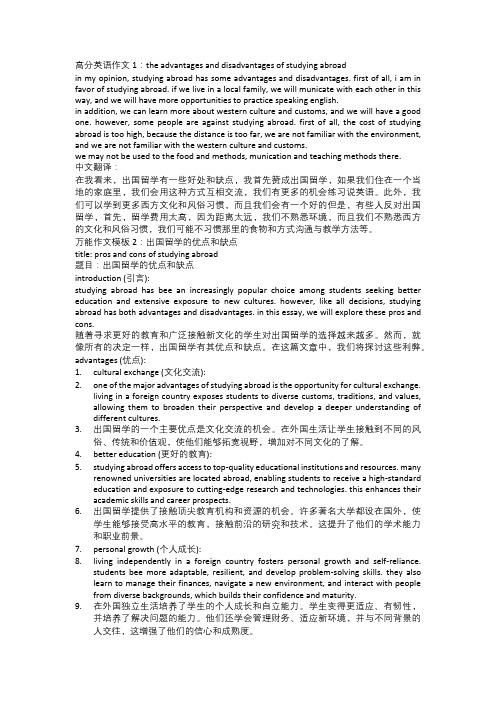
高分英语作文1:the advantages and disadvantages of studying abroadin my opinion, studying abroad has some advantages and disadvantages. first of all, i am in favor of studying abroad. if we live in a local family, we will municate with each other in this way, and we will have more opportunities to practice speaking english.in addition, we can learn more about western culture and customs, and we will have a good one. however, some people are against studying abroad. first of all, the cost of studying abroad is too high, because the distance is too far, we are not familiar with the environment, and we are not familiar with the western culture and customs.we may not be used to the food and methods, munication and teaching methods there.中文翻译:在我看来,出国留学有一些好处和缺点,我首先赞成出国留学,如果我们住在一个当地的家庭里,我们会用这种方式互相交流,我们有更多的机会练习说英语。
出国留学的优点和缺点英语作文
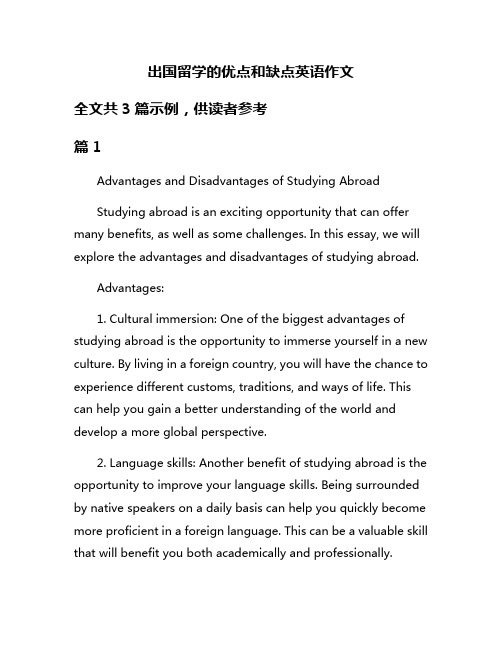
出国留学的优点和缺点英语作文全文共3篇示例,供读者参考篇1Advantages and Disadvantages of Studying AbroadStudying abroad is an exciting opportunity that can offer many benefits, as well as some challenges. In this essay, we will explore the advantages and disadvantages of studying abroad.Advantages:1. Cultural immersion: One of the biggest advantages of studying abroad is the opportunity to immerse yourself in a new culture. By living in a foreign country, you will have the chance to experience different customs, traditions, and ways of life. This can help you gain a better understanding of the world and develop a more global perspective.2. Language skills: Another benefit of studying abroad is the opportunity to improve your language skills. Being surrounded by native speakers on a daily basis can help you quickly become more proficient in a foreign language. This can be a valuable skill that will benefit you both academically and professionally.3. Education quality: Many students choose to study abroad because of the high quality of education available in other countries. By attending a prestigious university or college in a foreign country, you can receive a top-notch education that will enhance your academic credentials and open up new career opportunities.4. Personal growth: Studying abroad can also help you develop personally and grow as an individual. You will be pushed out of your comfort zone and forced to adapt to a new environment, which can help you become more independent, confident, and resilient.5. Networking opportunities: Studying abroad can also provide you with valuable networking opportunities. You will have the chance to meet people from all over the world, including fellow students, professors, and professionals in your field. These connections can be beneficial for your future career prospects.Disadvantages:1. Homesickness: One of the biggest challenges of studying abroad is dealing with homesickness. Being far away from your family and friends can be difficult, especially if you are in a newcountry where you don't know anyone. It can be hard to adjust to a new environment and cope with feelings of loneliness.2. Language barrier: While studying abroad can help you improve your language skills, it can also be a source of frustration and anxiety. Trying to communicate in a foreign language can be challenging, especially if you are not yet fluent. This can make it difficult to interact with locals, navigate daily life, and succeed academically.3. Cultural differences: Living in a foreign country means that you will encounter cultural differences that may be unfamiliar or uncomfortable. You may struggle to adapt to new customs, social norms, and ways of thinking. This can lead to misunderstandings, conflicts, and feelings of alienation.4. Financial costs: Studying abroad can be expensive, with costs that include tuition, housing, food, transportation, and other expenses. It can be challenging to manage a budget and afford the high cost of living in some countries. Financial concerns can add stress and pressure to an already challenging experience.5. Academic challenges: Studying abroad may present academic challenges, such as a different education system, teaching style, and grading system. It can be difficult to adjust toa new academic environment and meet the expectations of professors and peers. This can lead to academic stress, anxiety, and a decline in performance.In conclusion, studying abroad offers many advantages, such as cultural immersion, language skills, education quality, personal growth, and networking opportunities. However, it also comes with some disadvantages, such as homesickness, language barrier, cultural differences, financial costs, and academic challenges. It is important to carefully consider these pros and cons before making the decision to study abroad. Ultimately, the experience of studying abroad can be a transformative and life-changing opportunity that can help you grow academically, professionally, and personally.篇2Advantages and Disadvantages of Studying AbroadStudying abroad is a dream for many students around the world. It offers the opportunity to experience a new culture, learn a new language, and gain valuable skills and experiences that can enhance one's academic and career prospects. However, studying abroad also comes with its own set of challenges anddrawbacks. In this essay, we will explore the advantages and disadvantages of studying abroad.Advantages:1. Cultural immersion: One of the biggest advantages of studying abroad is the opportunity to immerse yourself in a new culture. By living and studying in a foreign country, you can gain a deeper understanding of the people, traditions, and customs of that country.2. Language skills: Studying abroad is a great way to improve your language skills. By interacting with native speakers on a daily basis, you can quickly improve your proficiency in a new language.3. Career opportunities: Studying abroad can enhance your career prospects by providing you with a global perspective and valuable international experience. Many employers value the skills and knowledge gained through studying abroad.4. Personal growth: Studying abroad can help you develop independence, resilience, and adaptability. It can also broaden your horizons, challenge your assumptions, and help you grow as a person.5. Networking: Studying abroad can provide you with the opportunity to build a global network of contacts and friends. These connections can be valuable in both your personal and professional life.Disadvantages:1. Cost: Studying abroad can be expensive, with tuition fees, living expenses, and travel costs adding up quickly. Financial constraints can make it difficult for some students to study abroad.2. Homesickness: Being away from family, friends, and familiar surroundings can lead to feelings of loneliness and homesickness. Adjusting to a new culture and way of life can also be challenging.3. Language barrier: While studying abroad can enhance your language skills, the initial language barrier can make communication difficult and lead to feelings of isolation.4. Cultural differences: Cultural differences can lead to misunderstandings, conflicts, and challenges in adapting to a new way of life. It can take time to adjust to a new culture and overcome cultural barriers.5. Academic challenges: Studying in a foreign language or adjusting to a different education system can be challenging. It may take time to adapt to new teaching styles, expectations, and academic requirements.In conclusion, studying abroad offers a wealth of opportunities for personal, academic, and career growth. However, it also comes with its own set of challenges and drawbacks. It is important to carefully consider the advantages and disadvantages of studying abroad before making the decision to pursue this exciting opportunity.篇3Advantages and Disadvantages of Studying AbroadStudying abroad is a dream for many students around the world. It offers a chance to explore new cultures, improve language skills, and gain a global perspective on life. However, along with the benefits, there are also challenges that come with studying in a foreign country. In this essay, I will discuss the advantages and disadvantages of studying abroad.Advantages:1. Cultural immersion: One of the biggest advantages of studying abroad is the opportunity to immerse oneself in a newculture. Students get to experience new traditions, customs, and ways of life that broaden their understanding of the world.2. Language skills: Studying abroad is a great way to improve language skills. Being surrounded by native speakers helps students practice and improve their language abilities in a natural and interactive way.3. Global perspective: Studying in a foreign country provides students with a global perspective on different issues. They learn to see things from different angles and develop a broader understanding of the world.4. Career opportunities: Studying abroad can open up new career opportunities for students. Employers value candidates with international experience and language skills, making graduates more competitive in the job market.5. Personal growth: Living in a foreign country forces students to step out of their comfort zones and become more independent. It helps them develop resilience, adaptability, and problem-solving skills.Disadvantages:1. Homesickness: Being away from family and friends can bea major challenge for students studying abroad. Homesickness can lead to feelings of loneliness, sadness, and isolation.2. Language barriers: While studying abroad can improve language skills, language barriers can still be a significant challenge. It can be difficult to communicate effectively in a new language, leading to misunderstandings and frustrations.3. Cultural differences: Adjusting to a new culture can be challenging for some students. They may experience culture shock, difficulty in understanding social norms, and discrimination.4. Financial constraints: Studying abroad can be expensive, with costs including tuition fees, accommodation, food, transportation, and travel. Managing finances can be difficult for students on a limited budget.5. Academic challenges: Studying in a different educational system can present academic challenges for students. They may struggle with unfamiliar teaching styles, grading systems, and coursework requirements.In conclusion, studying abroad has both advantages and disadvantages. It offers a unique opportunity for personal andacademic growth, but also comes with challenges such as homesickness, language barriers, cultural differences, financial constraints, and academic challenges. Despite the difficulties, the benefits of studying abroad can outweigh the drawbacks, providing students with a valuable and life-changing experience.。
英国文化教育协会吴媛媛分享:英国留学优势有哪些

英国文化教育协会吴媛媛分享:英国留学优势有哪些中国教育国际交流协会主办的2016中国国际教育展于10月22-23日在北京国家会议中心开幕。
来自澳大利亚、奥地利、比利时、加拿大、中国、哥斯达黎加、塞浦路斯、捷克、丹麦、芬兰、法国、德国、香港、匈牙利、印度、爱尔兰、意大利、日本、韩国、马来西亚、新西兰、菲律宾、波兰、葡萄牙、俄罗斯、新加坡、西班牙、瑞典、瑞士、泰国、荷兰、土耳其、英国、阿联酋和美国逾40个国家和地区近500余所海外院校参展。
英国文化教育协会教育推广总监吴媛媛为大家分享了英国留学优势。
英国留学优势第一,英国教育是一个非常有传统文化,尤其是高质量的教育环境。
英国的质量保证在全世界是排第一的。
所有的学生如果要到英国留学,学校一定是需要有一个申请,这个是有质量保证的,他们才可以接受国际学生。
在这方面来讲,学生的权利是有被保护的。
英国留学优势第二,英国可以为留学生提供很好的环境。
吴媛媛认为,作为一个国际学生来讲,出国留学最重要的是要给自己有一个非常好的体验,不管是在于高等教育的质量,还是在于自己生活的质量,英国是可以给国际学生两个最好的环境。
在英国接受教育回来之后可以达到什么?吴媛媛认为有三点是最重要的,分别是:创新、个性化、启发性,这三点其实是英国教育最独特的一点。
英国留学优势第三,英镑对于人民币来讲,人民币还是非常有优势的,所以现在是选择到英国留学的一个最好的时机。
英国留学优势第四,60万的校友团队会对学生回国后的事业有很好的帮助。
英国在中国有一个非常庞大的校友团队,回来之后大概有60万人接受过英国的教育,他们这些人是前辈,也是同学。
这样非常大的一个网络,是非常重要的,因为这样子也可以帮助回国后的英国留学生有非常好的人脉网络,不管对事业或社交都是非常有帮助的。
为增加英国留学优势,吴媛媛还给学生们指出三点建议:第一,留学英国,环境是多文化的,尽量跟其他从不同国家来的学生交流,这样会让视野更广阔;第二,除了在学校学习之外,一定要到英国到处看看,这是一生中非常好的通过学习的机会去学习其他国家的文化;第三,学习是一个过程,除了成绩之外,英国给了你什么呢?技能是永远让你在学习的。
海外留学的优点和缺点英语作文

海外留学的优点和缺点英语作文The Pros and Cons of Overseas StudyStudying overseas is a life-changing experience that offers numerous benefits but also comes with its own set of challenges. Here, we delve into the advantages and disadvantages of this unique academic journey.One of the primary advantages of overseas study is the exposure to a new culture and way of life. Students are immersed in a different society, allowing them to broaden their horizons and develop a more global perspective. This cultural exchange fosters tolerance, understanding, and the ability to adapt to new environments, which are crucial skills in today's interconnected world.Another significant benefit is the academic rigor that many foreign universities offer. Many top institutions provide cutting-edge research facilities and a rigorous curriculum that challenges students to think critically and independently. This high-quality education prepares students for leadership roles in their chosen fields.Moreover, overseas study provides an opportunity to learn a new language or improve upon an existing one.Language proficiency is a valuable asset in today's job market, and many employers seek candidates who are fluent in multiple languages.However, overseas study also has its drawbacks. The cost of tuition, living expenses, and travel can be prohibitive for some students and their families. Scholarships and loans can help, but the financial burden can still be significant.Additionally, the cultural and linguistic differences can be challenging for some students. Navigating a new culture, language, and academic system can be overwhelming, especially for those who are not accustomed to such changes.Lastly, the emotional toll of being away from home and loved ones can be difficult to bear. Homesickness, loneliness, and feelings of displacement are common among overseas students, and it is essential to have a strong support system to help cope with these challenges.In conclusion, overseas study is a rewarding but complex experience. It offers unique opportunities for cultural exchange, academic rigor, and language proficiency, but it also comes with financial, cultural, linguistic, and emotional challenges. For those who are willing to take on thesechallenges, overseas study can be a life-altering experience that opens up new horizons and prepares them for success in today's globalized world.。
国外留学有什么好处英语作文
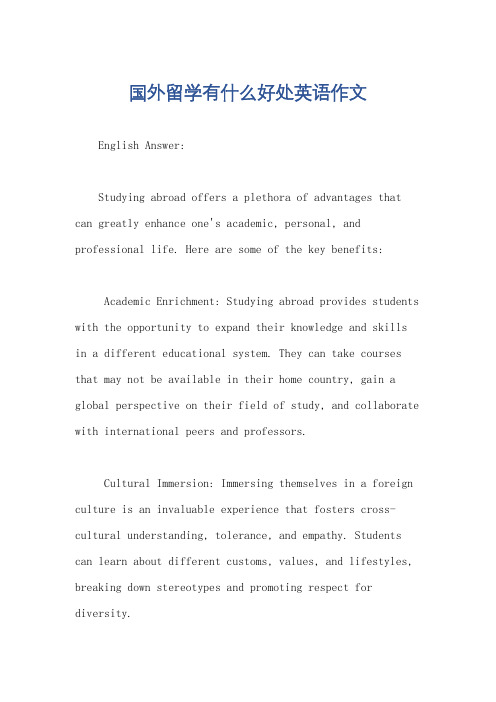
国外留学有什么好处英语作文English Answer:Studying abroad offers a plethora of advantages that can greatly enhance one's academic, personal, and professional life. Here are some of the key benefits:Academic Enrichment: Studying abroad provides students with the opportunity to expand their knowledge and skillsin a different educational system. They can take courses that may not be available in their home country, gain a global perspective on their field of study, and collaborate with international peers and professors.Cultural Immersion: Immersing themselves in a foreign culture is an invaluable experience that fosters cross-cultural understanding, tolerance, and empathy. Students can learn about different customs, values, and lifestyles, breaking down stereotypes and promoting respect for diversity.Independence and Maturity: Studying abroad requires students to step outside their comfort zone and navigate a new environment independently. This experience helps them develop self-reliance, problem-solving skills, and increased adaptability.Global Networking: International students form connections with people from all over the world, creating a global network of friends, mentors, and potential collaborators. These connections can lead to valuable opportunities for future academic and professional endeavors.Career Advantages: Studying abroad is increasingly recognized by employers as a valuable asset. It demonstrates that graduates have a broad worldview,cultural sensitivity, and a willingness to embrace challenges. It can also open doors to international job opportunities.中文回答:出国留学好处多多,能够极大提升一个人在学业、个人和职业上的发展。
出国留学的优势Advantages of Studying Abroad(初中英语作文)

出国留学的优势Advantages ofStudying Abroad初中英语作文Inrecent years, studying abroad has become a hot trend in China. Many parentsprefer to send their children abroad to receive the further education.近年来,出国留学已成为中国的热门趋势。
许多家长更愿意把孩子送到国外去接受更高程度的教育。
Studyingabroad has so many advantages. Firstly, we can see the world better and learnsomething about foreign countries. If we want to dosomething well, we’d betterput ourselves in that environment. Secondly, we can learn much more advancedknowledge of science and technology. Finally, we can use the foreign languagein our daily life, so that we can master it so quickly. I think in this way canwe enlarge our eyes and widen our minds.出国留学有很多优点。
首先,我们可以更好的了解世界,了解国外。
如果我们想做好一件事,我们最好身临其境。
其次,我们可以学习更先进的科技知识。
最后,我们可以在我们的日常生活中使用外语,以便我们能学得更快。
我认为这样可以扩大我们的视野和开阔我们的思想。
- 1、下载文档前请自行甄别文档内容的完整性,平台不提供额外的编辑、内容补充、找答案等附加服务。
- 2、"仅部分预览"的文档,不可在线预览部分如存在完整性等问题,可反馈申请退款(可完整预览的文档不适用该条件!)。
- 3、如文档侵犯您的权益,请联系客服反馈,我们会尽快为您处理(人工客服工作时间:9:00-18:30)。
英美留学优势分析
申请,只是这400所优秀大学分布在全球几十个国家中,选出一个满意又适合的目标国,确实不是件容易的事情。
下面来说说英美留学优势分析。
其实,并没有哪个国家的大学比另外的国家好还是差的概念,因为大学排名都是全球性的,即使某个国家只有一所大学进入了这个排名,而你恰好上了这所大学,那么你就是享受了一流教育。
反过来,如果某个国家有100所进入了这个排名,而你上的大学却没有在这个名单中,那么你即使留学了那个国家也没有享受到一流的教育。
我们以留学英国和美国为例做一次国家选择分析。
其它国家选择可以参照这样的选择策略进行分析。
在这之前,先插个段子:
留英的:你穿衣土…
留美的:我这儿中餐好吃(相对来说)
留英的:你穿衣土…
留美的:我有12个月OPT带薪实习
留英的:你穿衣土…
留美的:我每年有六万多工作签证和大把机会留下工作
留英的:你穿衣土…
留美的:你敢不提我穿衣土不?
留英的:好,美国人穿衣也土…
同为英语国家,也同为留学大国,英国和美国就像是两个完全不同性格色彩的人。
两个国家教育的特点和侧重点大为不同,培养出的学生思想和关注点也有很大差别。
好了,言归正传,让我们严肃认真的来看看这件事:
学制
英国的学制是本科三年,硕士一年;美国通常是本科四年,硕士两年。
所以完整取得硕士学位,英国花的时间要少得多,是图快捷人士的选择。
但大家也不难猜想,在这样的学制安排下,两国学生的体验及学位的含金量也不可能是一样的。
这将在后面进一步探讨。
费用
英国的费用显著低于美国。
在不考虑任何奖学金的情况下,国际学生在英国留学的成本是1.5~2万英镑(相当于2.4~3万美元)/年;三年就是4.5~6万英镑(相当于7~9万美元)
美国方面,私立学校在5~6万美元/年,四年就是20~24万美元;公立学校稍便宜一点,但现在也是3~4万美元一年,四年就是12~16万美元。
在美国,除了少数如加州伯克利分校外,好的并且在国内有较高认可度的学校还是以私立为主。
申请难度
总体而言,同样质量的学校,英国的门槛无论在推荐信、学术背景要求都比美国低一些,或者说更加灵活一些。
而且英国很多学校都提供各种形式的预科,可以念一年再升本科。
预科的门槛更低。
总的原因是英国学校全部是公立学校,资金方面不宽裕(甚至窘迫),因此很热衷吸引留学生(对国际学生征收的费用依法高于英国本土学生)。
这个结果就是——英国的中国学生素质更加参差不齐。
择校及中国内地对学位的认同
选择什么学校好呢?当然是越出名的学校越好了。
不要迷信特定年份的排名,因为它变来变去。
更不用专注你所在的专业的排名——对于本科生而言,这和你关系不大。
主要看历史知名度。
这里,英国被世界公认并在中国知名的好学校比美国要少得多。
最精英的两所,牛津、剑桥,其他的包括伦敦政治经济学院、华威大学、帝国理工、伦敦大学学院等都列于第二梯队,再就是曼彻斯特、谢菲尔德、兰卡斯特、纽卡斯尔、杜伦大学、巴斯大学等大学,都是不错的学校。
其实除了牛津剑桥外,英国其他学校之间的差别是比较小的,很同质化。
作为中国学生,选择的标准无非是在国内知不知名。
关于学位的认同。
如前所述,由于英国学制较短,门槛没那么高,所以现在内地对英国学位的认同度不如早些年了(譬如九十年代末或本世纪初)。
每年的就业市场上有大量的英国留学生。
这时比较看重的就是两条:一是排名尽可能靠前(譬如华威大学、帝国理工、伦敦大学学院等),二是毕业成绩一定要好(考虑到近年来英国大学发放学位等级越来越水,优秀学生应该取得一等学位First Class Degree)。
至于美国,美国学校的名誉度和认可度还是高于英国很多。
从各种全球大学排名情况就可以看出美国的实力。
基本上美国前三十的大学都是质量非常高的大学,社会认可度非常高;在排名前十大学的本科毕业,基本都可以自动被认定为“精英”(相比之下,对英国留学生就会有更多的疑问)。
这里还要额外提一下的就是美国有 University 和 college 之分。
University就是综合型大学,全面并且注重学术科研;college 更注重教学,许多美国中产及上层精英都选择就读 college(譬如希拉里毕业于韦尔斯利学院Wellesley College)。
这些学校的特点是教学水平高,美国人很认,但在中国内地知名度一般。
学习与教学质量
国外学校的本科教育和国内不一样,比如说一般没什么班的概念,就是学生选课上课,组织比较离散。
师生关系不紧密,课余时间也很多,所以很依赖学生自己的学习习惯。
学习习惯好的,积极向上的,善于利用学校资源的,在英国一所普通的学校也可以学得非常好;学习习惯不好的,放到美国常青藤也可能学不出来。
总体感觉,英国学校的教学质量还是不错的,主要是均衡和可靠。
英美大学教学一般分两部分,一是 lecturing,讲课;一是 seminar,课后
讨论。
Seminar 部分非常关键。
在英国上的所有课都是教授或讲师亲自主持的。
而美国的 university 特别是常青藤名校,教授都过于注重科研甚至社会活动,不太重视教学,搞到 lecturing 有不少时候居然是助教在讲(哈佛就一直有这个问题);而 seminar 几乎肯定是助教(往往是博士生)主持的。
这样一来,教学质量就受到很大影响了。
这方面,美国的 college 比较好,师生比显著优于名牌 university,教师主要精力放在教学。
综上,对于真正想得到最好教育的,美国的 college 是上选;英国的大学一般而言还是比较可靠的,美国的 university(包括哈佛耶鲁),专业、课程、教授之间差别就比较大了。
这里要提到的是教学不光是课堂,还有课外活动。
这一点美国大学优势较大。
美国的大学都有非常丰富的活动,例如各式各样的讲座、学术会议及交流活动等,学生可以广泛参加,而英国学校这方面要弱一些。
所以在美国上学,整个经验和视野可能更开阔一些,不局限于课堂和图书馆。
职业意识与就业机会
这方面美国明显优于英国,而且差距不小。
在美国念本科,由于校园的氛围——比如美国大学都有能力很强很尽职的帮助学生找工作的机构;稍微好一点的学校,各种企业来访招聘也很多,西方学生也有这种意识。
在这样的熏陶下,学生的实习/就业意识会比较强,更加“早熟”,例如大多知道该积极地安排假期实习。
但在英国就不一定有这种意识了,首先因为缺乏这种氛围,其次也很取决于你所在的中国学生群体。
另外还和能接触到的机会有关。
毕竟美国是世界上最发达的经济体,世界顶级企业众多;但凡在大城市就读,接触职场的经历会很多。
还有一个希望强调的就是学制。
英国学制三年,也就是到毕业就学只有两个暑假(大一、大二)。
而美国四年,有三个暑假。
这就是一个暑期实
习的差别,对履历的贡献影响是很大的(一般正规的国际机构、企业都是在本科生毕业当年的春天确定招聘)。
再考虑到美国校园更成熟的职场意识,更开放的环境,更丰富的求职机会等,差别就成倍放大了。
总之,在美国,学生在职场意识上会更早熟。
他们有更多的机会寻找从美国到大中华地区的工作机会,而且在就学与工作的衔接上可能更有效率(即本科后直接工作,之后再根据需要就读含金量更高的硕士,如名校MBA)。
英国学生更加被动,本科读完就读硕士,读硕士忙碌的一年又要匆匆忙忙地找工作,学业和工作兼顾得很辛苦。
还有一点考虑就是美国是移民国家,热衷于吸引国际人才,也容易容纳国际人才,好的就业机会也多,所以毕业后留下来的机会更大。
相比之下,留在英国就更难。
英国留学生毕业后多选择回国。
其他因素
至于说美国很乱,英国很保守等,都是以偏概全的臆断。
其实由于英美高校拥有极大的办学自主权,所以每个学校的特色都是非常鲜明的,越是一流大学越是与众不同,不可能有概括性的论断。
因此,在国家的选择上,除了考虑上面提到的客观差别以外,我们更倾向于看孩子是否在以往的经历中对哪个国家更有感觉(不一定去过,比如朋友、电影、小说、歌曲、媒体等的影响),如果他们从内心就喜欢和向往一个国家,这样的心理暗示对他们积极自信地去留学是非常有帮助的。
